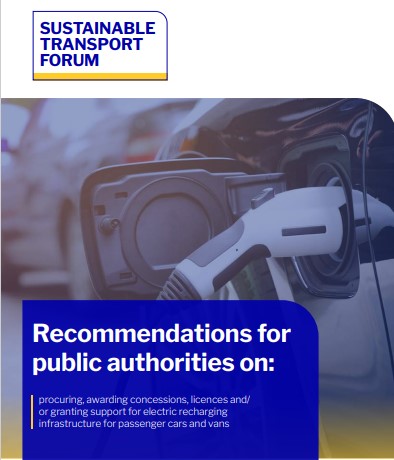Guidelines for policymakers
Through different initiatives, the European Commission is providing guidance and best practice examples to public authorities and other relevant stakeholders on the deployment of alternative fuels infrastructure and vehicles. Different areas are and will be covered, revised, and updated.
In particular, the main recommendations, reports and handbooks prepared by the Sustainable Transport Forum (STF) are made available in this section. The STF was set up to assist the Commission in implementing the Union’s activities and programmes aimed at fostering the deployment of alternative fuels infrastructure to contribute to the European Union energy and climate goals. It serves as a platform for structural dialogue, exchange of technical knowledge, cooperation and coordination between Union Member States and relevant public and private stakeholders. More information on the STF can be found here.
Another important source of guidance is the The Urban Mobility Observatory ELTIS and their mobility plans platform. Current and revised guidelines related to electromobility will be also made available here. For more information on ELTIS and Sustainable Urban Mobility Plans you can visit: https://www.eltis.org/mobility-plans.
Sustainable Transport Forum (STF)
The EAFO consortium supports STF by providing assistance in delivering recommendations across various topics, related to alternative fuel infrastructure.
STF sub-groups
STF sub-groups are important facilitators of delivering policy recommendations to public authorities. In accordance with Article 5(2) of the Decision establishing the STF and in accordance with Article 8 of the Decision renewing the STF, DG MOVE may set up sub-groups for the purpose of examining specific questions on the basis of terms of reference defined by DG MOVE. Sub-groups report to the STF plenary. They must be dissolved as soon as their mandate is fulfilled.

- Sub-group (1) on governance and standards for communication exchange in the electromobility ecosystem (with particular focus on ISO 15118-20 and related PKI). This sub-group will propose minimum principles and a governance framework for communication between the electric vehicle and the recharging infrastructure, ensuring interoperability in the whole ecosystem. It will moreover prepare the ground for harmonisation and convergence of electromobility communication standards and protocols.
- Sub-group (2) on a common data approach for electric mobility and other alternative fuels: building on the work of the Program Support Action (PSA) on data collection related to recharging/refuelling points for alternative fuels and the unique identification codes related to e-Mobility (IDACS).
- Sub-group (3) on best practices of public authorities to support the deployment of recharging infrastructure: This sub-group, which consists of public authorities mainly, will further the work on the 2020 STF Recommendations for public authorities for procuring, awarding concessions, licences and/or granting support for electric recharging infrastructure, generating a (bi-)annual update to ensure the recommendations remain relevant for public authorities. The sub-group will moreover look into possibilities to harmonise permitting procedures for alternative fuels infrastructure in the EU.
More information on the STF and the sub-groups can be found here.
Task Forces in the Sub-group (3) on best practices of public authorities to support the deployment of recharging infrastructure
TF1: Best practices guide for permitting & grid connection procedures
The objective of the work developed under this task force is the development of a best practice guide for permitting and grid connection procedures. The first step to develop this guide aims to identify, map, and assess the problems encountered in the EU by project developers in the administrative process of applying for a building or operating (environmental) permit, or in the process of applying to the local DSO or TSO for a grid connection for that same infrastructure.
For this, an assessment survey was sent to both Public Authorities and Market Players focusing on gathering information about
- Permitting procedures
- Grid connection procedures
With this survey, it will be possible to identify specific problems, bottlenecks, or limitations related to those processes, and obtain the point of view of both the Local Authorities and the Charging Point Operators.
TF2: Development of templates, tools, and standard contract provision
The objective of the work developed under this Task force is to create a joint fundament of knowledge, thereby supporting public governments and accelerating the rollout of recharging infrastructure. To reach this goal, a set of different templates, standard contract provisions, and other “off the shelf” solutions will be developed for use by public authorities in their public procurement, concession, license and/or grant award procedures for electric recharging infrastructure.
TF3: Recommendations for recharging infrastructure roll-out for specialised and captive fleets
The objective of the work developed under this Task force is to provide a set of recommendations focused on the deployment of recharging infrastructure for specialised and captive fleets such as taxis, (urban) logistics, and shared fleets.
Captive fleets include:
- Fleet vehicles with predictable driving and refueling patterns
- Vehicles making regular visits to or overnight parking at a depot
Specialised and Captive fleets are centrally operated fleets such as:
- Taxi-fleets /ride-hailing fleets (e.g. Uber)
- Shared vehicle fleets (e.g. GreenMobility, Cambio, Zipcar)
- Urban delivery/utility fleets (e.g. DHL, Bpost, PicNic)
- Urban duty logistics such as special corporate fleets from big operators
TF4: Revision of SUMP electrification Guide
The inclusion of e-mobility in Sustainable Urban Mobility Plans is a fast-developing field that requires an update, since the latest ELTIS Guidelines for SUMP date back to 2019. This task force will develop its work considering new important references. The SUMP guide electrification update will develop under a co-creation process, to reflect local PA planner’s needs, including front-runner's experience but also Local Authorities in the process of SUMP electrification development and less advanced LA who still need to develop a SUMP guide. TF4 work will integrate other relevant STF-PA information as well as information already available from other sources.
TF5: Development of a guide on accessibility of electric recharging infrastructure
The aim of the work developed under this Task force is to support the Public authority’s goals to implement EV charging infrastructure that allows for seamless mobility and accessibility for all users, including persons with disabilities and the elderly. There are still challenges to resolve, with particular emphasis on the fact that the deployment of the recharging infrastructure is happening now, and these concerns aren’t sufficiently addressed.
The work developed under this TF will consider three main levels:
- Hardware: pole/charging station (development of EU standards)
- Associated parking spaces and surrounding environment (benchmarking of accessibility norms/regulations in different EU Member States or component authorities)
- Distribution/location of accessible recharging poles/stations & parking spaces (exchange of experience and good practices with other local stakeholders)
Downloads
Handbooks, guides and reports, created by the STF members, and available for download.

Publications

Sustainable Transport Forum Handbook
Pricing of Electric Vehicle Recharging in Europe

